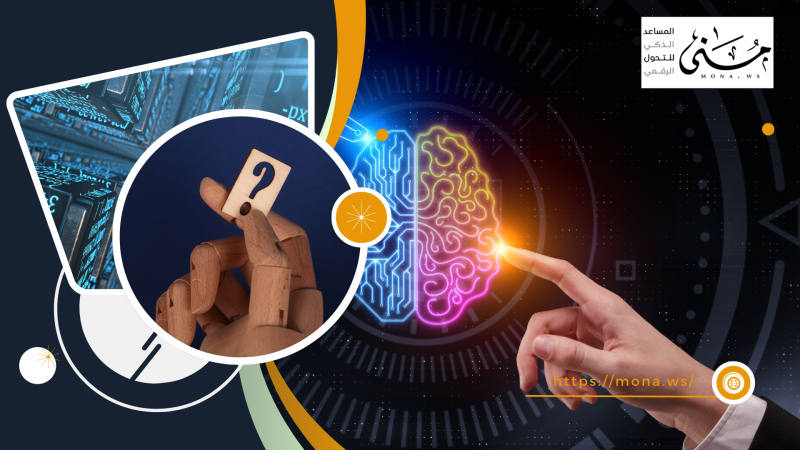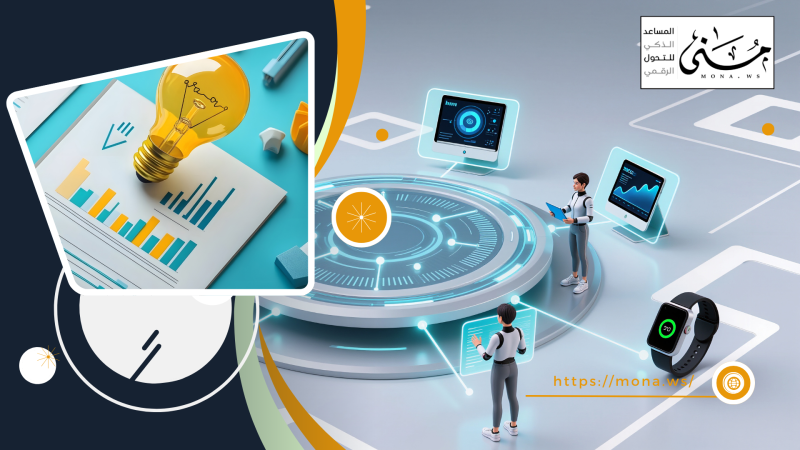With the increasing volume of data, artificial intelligence has become an essential tool for analyzing it and supporting decision-making in governance. By providing accurate insights, artificial intelligence contributes to improving performance, enhancing transparency, and raising the efficiency of government operations to meet the requirements of the modern era.
In this article, we will explore how AI contributes to data analysis and its role in achieving better governance that reflects the needs of the modern era.
What is corporate governance and its importance?
Corporate governance is the framework that defines how companies are managed and directed to achieve their goals in a transparent and responsible manner. Governance includes policies and structures that establish the values of accountability and transparency, which enhances the confidence of shareholders and customers alike. Governance has become an essential tool for companies to ensure compliance with regulations and laws, in addition to achieving operational efficiency and sustainability.
Improving governance requires the integration of modern tools and technologies, and here artificial intelligence appears as a key factor contributing to providing innovative solutions that help companies enhance their institutional performance.

Statistics on the impact of technology on corporate governance
Recent statistics reflect the importance of technology, especially artificial intelligence, in improving corporate governance, according to reports issued by global consulting firms:
- About 45% of large companies use AI to analyze corporate governance data.
- The AI-based governance technologies market is expected to grow at a CAGR of 12% through 2030.
- Companies that have adopted modern management systems like DocSuite have seen a 30% improvement in work efficiency compared to those without advanced digital systems.
These figures confirm that integrating technology into governance processes is no longer an option but a necessity to achieve competitive advantage.
Evolution of governance systems using artificial intelligence
Governance systems have witnessed a great development over the past years. Initially, they relied on traditional methods such as paper meetings and manual reports, but with technological advancement, companies have come to rely on smart platforms that facilitate management processes and enhance transparency.
As a leading example, we can mention the “DocSuite” system as one of the most prominent innovations in the field of document management and enhancing corporate governance. This system combines artificial intelligence technologies and smart organization tools to provide an integrated work environment. Through this system, companies can:
- Manage documents electronically and securely.
- Monitor administrative processes accurately and transparently.
- Improve decision-making speed with instant analytical reports.
Challenges facing companies in improving governance
Despite the great benefits offered by technology, companies face multiple challenges in improving governance systems. The most prominent of these challenges include:
High cost of advanced technologiesInvesting in modern platforms is a challenge for small and medium-sized businesses.
Lack of technical awarenessSome organizations still lack sufficient knowledge of the importance of technology and its impact on governance.
Resistance to changeSome workers tend to resist digital transformation due to fear of losing their jobs or lack of familiarity with new technologies.
Security challengesWith digital transformation, the risk of cyber attacks increases, making data security a top priority.
As technology continues to advance, AI will become an integral part of corporate governance. Successful companies rely on investing in intelligent systems to improve business efficiency and ensure transparency and accountability.
Moving towards digital governance is not just about improving management, it is a strategic step towards achieving long-term sustainability in a challenging world. Companies that rely on artificial intelligence will not only maintain their competitiveness but will also excel in building trust with all stakeholders.
AI Data Analysis Tools
There are a large number of artificial intelligence tools that are used to analyze data. We will show you some of them with a brief explanation of the role of each tool:
TensorFlow
It is consideredTensorFlow is one of the most powerful deep learning and machine learning platforms, developed by Google, and allows developers to create and analyze complex data models. TensorFlow is widely used for big data analysis, especially in applications such as image classification, text processing, and predicting future trends.
PyTorch
PyTorch, developed by Meta (formerly Facebook), is a flexible and powerful framework for developing machine learning and data analysis applications, easy to use in research and development, with extensive support for deep learning and neural networks.
IBM Watson Analytics
It isWatson Analytics is an AI-powered data analytics platform that provides integrated solutions for discovering patterns within data. Watson provides an easy-to-use interface to simplify data analysis and explore hidden relationships that are difficult to notice manually.
Google BigQuery
Google BigQuery is a cloud-based data storage and analytics system designed to handle massive amounts of data, uses AI to deliver accurate and fast insights, and integrates with other tools like Google Data Studio and TensorFlow.
Microsoft Power BI
Power BI is a data analytics and visualization tool from Microsoft that uses artificial intelligence to transform data into interactive dashboards and predictive reports that help businesses make informed decisions.
Tableau
Tableau is an advanced data visualization and analytics tool that offers the ability to integrate artificial intelligence to provide predictive insights and explain complex relationships between data. It is widely used by businesses to analyze financial, marketing, and management data.
RapidMiner
RapidMiner is a comprehensive data analytics and machine learning platform that allows users to extract, clean, analyze data, and build machine learning models without the need for advanced programming expertise.
Apache Spark
Apache Spark is an open source framework designed for high-speed processing and analysis of big data, supports machine learning and distributed data analysis, and is widely used in complex data analysis environments.
SAS Visual Analytics
SAS Visual Analytics is an advanced artificial intelligence platform that allows businesses to easily process and analyze data. The tool provides features such as text analysis and predictions using machine learning techniques.
Alteryx
Alteryx is a data analytics tool that focuses on making complex data analysis and prediction easier, with a visual interface that makes it suitable for non-technical users, and the ability to handle machine learning models.
KNIME Analytics Platform
KNIME is an open source data analytics platform that provides integrated tools for analyzing text, numerical data, and creating machine learning models. It features an easy-to-use interface and offers integration with programming languages such as Python and R.
H2O.ai
H2O.ai is an open source AI and machine learning platform that provides tools for predictive data analysis, text analysis, and probabilistic models, and is widely used in the financial and business industries.
DataRobot
DataRobot is an automated machine learning tool that helps businesses build and develop data analysis models easily and quickly. The tool relies on artificial intelligence to provide accurate analysis and future predictions.
DocSuite
DocSuite is an integrated system that relies on artificial intelligence technologies to analyze data and organize documents and administrative procedures. DocSuite is designed to be an effective tool for companies and institutions looking to achieve a comprehensive digital transformation. The system enables intelligent analysis of data extracted from documents and papers, which helps extract important information quickly and accurately.
It is usedDocSuite improves administrative processes by automating repetitive tasks, analyzing patterns within administrative data, and providing detailed reports that support strategic decision-making. The system provides features such as:
Organize documents: Classify and organize documents in a smart way that makes it easy to access and analyze their content.
Text data analysis: Extract patterns and trends from administrative texts, such as contracts and financial reports.
Integration with other systems: Supports integration with other business intelligence tools such as:Power BI and Tableau to deliver interactive insights.
Flexibility and securityIt relies on the latest cybersecurity technologies to ensure data protection, with a flexible interface that suits the needs of companies of all sizes.
Thanks to its reliance on theAI, DocSuite is an ideal choice for analyzing data related to document management and streamlining internal processes, increasing efficiency and reducing operational costs.
AI data analytics tools offer advanced solutions that enable businesses to make informed decisions and increase operational efficiency. Choosing the right tool depends on the company's needs and the volume of data to be analyzed.
How does artificial intelligence help data analysis in governance?
Artificial intelligence plays a crucial role in improving governance by analyzing data in advanced ways that contribute to making strategic decisions based on accurate and transparent foundations. This impact is achieved by using artificial intelligence technologies to analyze huge amounts of data. Here is a breakdown of how this is achieved:
- Promoting transparency and accountability
It helps theAI in collecting and analyzing data related to the performance of institutions, whether at the level of human resources, operations, or financial management, for example:
- Intelligent systems can track financial performance and detect any irregularities or irregularities as soon as they occur.
- AI tools are able to generate comprehensive reports that show how resources are being used and identify areas of waste.
This level of transparency ensures better accountability and reduces administrative corruption, which enhances trust between government agencies and citizens.
- Make data-driven decisions
Supporting decision-makers by analyzing data in an intelligent and effective way is one of the most prominent roles of artificial intelligence in governance, technologies such as machine learning (Machine Learning and Deep Learning provide:
Advanced InsightsArtificial intelligence can process historical and current data to predict the outcomes of different policies.
Suggest solutions: Providing evidence-based recommendations for policy and law development.
Crisis management: Analyze fast data, such as emergency reports, to make immediate, accurate decisions.
- Enhancing compliance with laws and regulations
Intelligent systems embedded in theAI governments and institutions to comply with applicable laws and policies by:
- Monitor processes and procedures to ensure compliance with legislation.
- Automatically detect violations and alert officials about them.
- Use predictive analytics to ensure future compliance and reduce regulatory risk.
- Improve efficiency in resource management
Data analysis using artificial intelligence contributes to improving the use of human and material resources, for example:
- Algorithms can determine which resources need to be reallocated for maximum efficiency.
- Analyze operational patterns to reduce waste and increase productivity.
- Managing public assets, such as infrastructure or energy, in a sustainable way based on data.
- Improving public service delivery
AI enables governments to analyze data related to citizens’ needs and improve the quality of public services by:
- Identifying the problems facing certain segments of society.
- Proposing policies that contribute to improving services such as health, education, and transportation.
- Monitor the effectiveness of government programs and make improvements based on data.
- Cybersecurity and Sensitive Data Management
One of the most important benefits of artificial intelligence in governance is the protection of sensitive data related to the government and citizens:
- Automatic detection and remediation of cyber threats.
- Analyze data to detect any attempts to hack government systems.
- Develop long-term strategies to protect digital infrastructure.
AI helps enhance governance by enabling deep data analysis, increasing transparency, and improving decision-making. Smart tools contribute significantly to reducing risk, improving efficiency, and ensuring compliance with laws and regulations, supporting the building of more sustainable and just institutions.
 الذكاء الاصطناعي عامل أساسي لتقديم حلول تعزز الأداء المؤسسي
الذكاء الاصطناعي عامل أساسي لتقديم حلول تعزز الأداء المؤسسي










Comments
Add New Comment